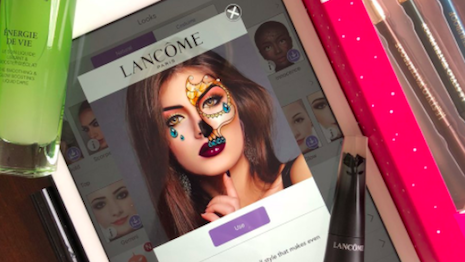NEW YORK - Love them or hate them, influencers are without a doubt one of the most important factors in advertising today, particularly when it comes to luxury cosmetics.
At the French-American Luxury Exchange held in New York on June 7, a panel of experts from the worlds of luxury cosmetics and influencer marketing spoke about how important it is that brands develop relationships with influencers today. One of the most important things spoken about during the panel was that brands need to make sure the relationship is authentic and more than just a transaction.
"You develop an authentic relationship by working with people who genuinely like the brand, not just because you're paying them," said Tara Liggins, director of social and influencer marketing at Lancôme USA. "The authenticity is in building a relationship that is personal but also professional."
Organic relationships
Influencers are incredibly important to the luxury market today.
Luxury has always been aspirational, driven by consumers' desire to live a certain lifestyle epitomized by their idols. That used to mainly be celebrities and movie stars, but now that role is increasingly taken up by social media influencers.
For wealthy consumers, the type who are the main audience for luxury goods, influencers are more effective than typical advertising.
"Advertising is a tax on poor people – if you have money you can avoid ads," said Scott Sassa, chairman of Milk Makeup. "We need to market to people differently.
"There was a survey of millennials about TV advertising that said they don’t care about TV advertising anymore," he said. "You have to go out and reach to consumer directly."

Brands are driving influencer marketing growth with bigger budgets. Image credit: MyTheresa
Even brands who elect not to work with influencers, though the wisdom of doing so is questionable, are advised to keep track of what they are saying about their brands.
Audiences hold influencers’ opinion in high regards. While the brands they love will see a boost from the influencer’s audience, the brands they dislike could suffer the opposite fate.
"Influencers represent these brands," said beauty blogger and influencer Maryam Maquillage. "Whether we say something is good or not so good, we are still representing them.
"It's important to find out who these people are," she said. "Watch their channels, consume their content."
It is no question that brands must learn how best to work with influencers, especially given their increasingly prominent roles in the consumer purchasing process.
Seventy-eight percent of marketers working in fashion, luxury and beauty report leveraging influencer campaigns, marking a 13 percent increase in the past year.

Brands must select influencers carefully. Image credit: Lancome
According to a report from Launchmetrics, brands are also investing more heavily in this tactic, with 60 percent of marketers expecting their budgets for influencer efforts to grow in 2018. With millennial and Generation Z consumers driving much of luxury’s growth today, influencer marketing has become a key component of marketers’ outreach to these digitally-native individuals (see story).
But one thing brands must understand is that influencers are not employees.
They have their own thoughts and opinions, which should be respected. Brands should not expect them to always use pre-approved language and speak about the brand in glowing terms.
"If you try to restrict their content or only select people who don’t talk about any other brands, it can be really detrimental to you in the long run," said Conor Begley, co-founder and president of Tribe Dynamics. "It's important that Maryam has the freedom to talk about whatever brand she wants."
{"ct":"vPHufblSvmNzCs5MwmgHltb1ZiFhGplqmyWGGkKyZP4SL14r2bbpPPIIu+kCVaKRXHlEZQj\/RmvbXAQ7i+LDAaVcG4u\/A01K2OwitPcvt\/BFRirQi9Qjn9V0KtxVMdPSACKtZnawvrLm2jaZQBJlvFJ+FBNVLNt56SUEeSBgDhmBbSVTW65JDeyvcklx3UDmr4k0td1r4o0v6dq4Lchf2cKxwG6Q04YNm\/PCFrR5wbXWI12OIxJ3JoAkWsrNRSEt54uT173Z00GZ9Uq4WCtC\/gYxH0Dc\/UFQ3ZZjwhWi63mbdjEf0zS5gy1cO1aQ7y8o8Kl\/ZwaASwH94G85rtRS9kES0Z7dGeB+JsGr1X6e45ucQtRDE0yTlqWhccA8e12n\/K\/JbQLhiPphwg8dD5zlnLSWNnuYKJ8uVpDy8D+JbUkpFdkjzdwXYjiLG2ioDyS+\/tifmS\/7wwQUPfQ3Gypbu3alpilc2uUbyD6EsNvjHmEAaYUrflDiJxUZuohpvsea6LeE1AwSIR6m91T6wWROeh2U6fERklB4rB8\/LNi2PttSiL53k1zVXs\/js8WQs\/vRtXhUI+bUQXnkpOkpWeUJl8EiVHOyFO9KCRjAGtb90XYQ3Kpx0u1BMHsLwcD+8szBrvB7DrSAeQC8uMn39Y1L4\/4Zn6srnl+3yE6IDMCvMrk2XiogWG49BiazdJyzny3z6rJU1ZoFER9Lm\/iWmJd41h0vfX6zN440mo65xqF6Fgdk2xFsfcufz+PEpQeEKXC8jJgC1MpWbCPZA5qvQAhzfj\/GxCpQetDvuJ2aRtAx7TyQYGdpmR+iV6NEl8UvBolxhwuJkocjo5VPKGCdtwYziI6hW+NfxceE1ozl\/EHLaLW0N6qHuIevmfWtTE2TeoGKg9b0yvrvMEqeVOM0ISCn8OXbi7OwLlPSGCPWhE5t6v37pRO\/AXjT2f4mC37Z0S1pUc80aa6mnesImghdpBpIKxDDp2IVbm45XUPY3ZLwdg6HitwdhJOtc5BtBO3QQSL0bdtQFGX5dRRsR\/jCSB7W39PaM+GI1o9\/bvoEjxNgOPWUJzBbq17XL5UxPXOXvmdwNdnPHYGxJ3q0FQbb3MqaT2C7v86lT5hylUXs8cUQvXA0U5xTEpAwOg3oMjEXPMfUOAFSTuDIEantdzMbcLzwly40GAIq5gCbllOzSnljOT6WPThPtvQj2eDpNSz\/uYAOrlaKE347Q4CHvwdzzAd1tMTSreGyOTzSnt8YTkMvzGfxSxKJ+NMstoC234tmaE15CpL6xFPj1qbGlB\/fieAoOKyBt0Xic2HV96vAlquAU6fKoP1H8PUSg4pn3EVaE77QgJHwv5KEisXC3azpwS1j9B7+utrxCVY5meMj6yVHpkF7KSkzS6UZnhZDp\/tRRMzl\/yjHoQwd78Xgg7PLChBmqW\/OpW4Ri8yB\/H3F072m\/OZQYdcAhbysVvY2+z8Jw1nj\/+P8Fi9yD\/kZbb+c7ywap2BoEfycUrsCm89oLm73bGvnYyfUqTc6eb+zsUphXzAtfmV4pEP1uMq7+yL0hsdsEyLrYcPbHJC3sPCwsBZsr9P5VqAEN5CzeyjIWbfdSUYbKPKNELNKWJ3iiSXZ9v4Fwk4DwOD3ZubOkAPxe2gvIL\/eQIB19qFBoKFjoXStydDJ9fV7pDMx04wveG1Un4Rx3+h03FTqRsIrYQOTuPGbBsAypuhVawQ4UfXvGlT76MWLW9U9BK1Y5LxiHR9n1yknnj\/QXpOPRgyDs473S30ZoQ3DZ6dleFNEA9YMCjwXuPasynwUbqcJytNqV8gyczR\/FDwEKh59IVGpEPDQ\/a295PqTKr+IFugxkAThd4qfNquA2XH0oLFiGSWmlUvdS6rCkXfVbqI1efx5b4WXSGuV2PHLm3d9oSm6MdL3QHicBebzI6pKeFdA9Qt9F0y5jMd41UXy2Axhl\/7yTpcw5e5qApg9xcpDJobdymoxLTmiPot0SXbuKK+baDZYJlOEptl6inInL9Gzrcbg9HwbLmiIN1vqxENwc+0GBhzEoo454OUijbyy+TxFj\/UFToFYqbk+0X2NDAwPEFXRGqPTWEiWoenSqU3uCjq0NDojtCiIdfRzKSkMQEagljDsHhlxdvi0\/ROBnMIdZO5eyN3nTUaAKfaBtaL4jvxsYAHX9mEp8TUeHcY3ZPWj2wfNKaXiWAfk\/OsMFgcYzYmIU9OMEZ8IPm2PHJym0lmsEMbr\/3zMf9ExCNmfsmpaD8L6+C7wMJNDCEdNrQwOTrmYPl+7veOr6GRba\/+Abwdc97ghd3NxPAtrLvGMFnSIuAHDBn9IAF\/f7LeADgCKij9Z5rWMbyhfH51bIPExTy4jW9FDnsZdJcKHNiI7n+XxSScjB6oUZxJxO4jJcHwpJzyJyF9JzxC8QK9kO7Ux2CBHmvgwJ6P4Hekx35T36oO72bYz\/BSK7IjJxMVKgeT1LKBYeBOxU9m\/pvs6NSUxXpVQWvd7BIE5u+yyRNFazuY\/3YpGcXT5VAJ8kzo77NFQYUvBof1fgU\/B5uySiaPVx2er63Z8ATwYhmERDgmdjzhAMlfj5kAc81hse03jqFP71In2NpsciP3zmytAQ3bsMwpjtMisA3bRf\/ovwJlc340qdo72N7lBAPgNtOUF1MoDxQ2xmE29uVHpDGrTeFtWkhe2LFgIZtCupgf0TCLW0nn4aHCoqUK9uuAlc5ivjWJ1Ftjof+z0OG4qClP+KpVuC7Q\/MxMbXpOVSxQ3+H4o0UILh+4K2DcQ\/jyhC+oIwmAGMhkAKr51Se2\/w6blbZMFIkqwvgTu5eU9Uv\/GAnBfNLptJuHH6Zdm3z0Fs6odukpzO5x733oX+3mDWCfQWj5Kb+\/jNlvp77gFjDANqxQzKRVf6MZIFTvgIEJBq2vp8T\/ithUw22babi7l9oNyVhkGx4vWiHyS0pgPAFyadO5rLjX+gjUORMnL35NH1h1UX6HfcWnEFqYJGEKGptRP4yLchnD10aNW9gjT0oaCGY3hSIHF+tuD+NeK30Mn9VxKuk8\/dOZHXIPjhA523gRpFKEgUQZ56DGu8kk39cL9kkNFW2vx9gTpPAs5vSaVmTQCF9ej4MscgWjzK0bYqwcUwJ7QRB3RZ\/PI30JAYAER\/a27AhMVViOekAvAtLzfBNUVCdRVP96k9TsyYoSkonwINf7QRfLgTQ9F4TTBAuIJ3\/mLCvn3D1efcvvJHv5z2zyuUpYU68PVzXMbqhbP6rxw+tdPjHXQkZtaB0cql6391anBqYE+kdVjauxRABL+0wcwjSC\/b0N+dopmHKRRTOi10w4ZhpQv6Xso8E2w8jy36Z2tqy9TOc2a6Rxko7IeYgNzewrOEoL3HmzphRtE1MJRkx5qywMwZpdv9Aa42kShkxSh16cOmq2zNITNHJGa6ZzZrFy9RKnKuRcAM9OkkdB2ItKq0F9EKMoa6UXc6fOHbkeyh5JQ\/rjXIyG4ggC9Mn55+oZ0zLmb8bjjiFx1Xr3uPb5UNb5+kgGm0jQtzUDc1Y76k1kxLe3+zULBBIN4HXepI8cc5Hv3y\/iKVNdW4lam5a94WzxqUgNwdPT9tL8RKyWBAXrkKnQpPIdwCSs76NECj6LY\/V3pwQhlHWQBH5Oo+ejnvW0TAQsFLgmSrIvR1zRhyNNaNmxjmKnIHyovhAEq5IW6i+WDVU+Eqn1\/HQfhXimjWYHgHKvn2x43Or3InS3qNtyBMHT1A6Vk\/JyqsyN\/dobkWrezXiG57c3X3KJx+B4atniLWkH0rw6pm4KCKXYrmvy2snjdCbdusNBb0uG0Dk1z4PyJdnpztZRg+14PVxYGdP24T2h8B5mxi68OabLI\/ViLU5nw4BtZQIIUNJ5we9IelWnh7FQr6nMk+nMsUKNI9tNcfd5uimFEn1C6tvea2h\/6NNEkWdwDpg9Zd1x5qZ2rwCtJZ3ybDcNL0lre7igJVY09VtWMXRe7IfKPwf9JPxALghKFrNp2l7URZcaM9acXx0aMVWzOQvTtn9sfn1KnR4b4FyR2EGcHn1b0Ywrz4+0AXq1GQDQNi4CxYKcCeriuuz6bBqdnR4ocQcLOYrpDe3sLrMxXxbrGc\/gqc0Eia3ETwdhkVwHs\/aZFLLydckFJy\/O+yNjZfm5kFARxv3702B255Lkek7cNjqv41gouLdw8V7WK9T7Fg7lzVVL1H\/wJZ6g8\/fn3pT4MMS4BBq9dgELiylxTmnRjJIRMl8igrPlIqHJKhXpy9N1yc7oCtPmth+F4wFsLTVXLE\/5fFTS7pXDpaSO+oO\/F9hV4uP7qeYW2amfOmwshMV4Ho5t9K7pgCDap1O2\/aHEmaROJPtqCpWaHVCORmBNhsO8hcG8IpVQsS1\/bnjFJG5ySDc7g4qI5nW3WVv4DRYDPf6VtZPPnmMl3948QdZQUPiVa0nVhRU3cEdnpyuzDGbHRJaoqZU8\/t7LRnQF5SCbxMDEJaf+7+7eqlAXWWJzdA60UkC8G8vjDqPbw1b6eNZHDEzQfjPjQmd0+1cCJe4n75O9bcrOpkeoD\/zkWcTuoYWNe1o0iIs9CEyHkEwYhz1gbrQsSnQmhEVPzbZ+JHWmeg1L1t2R7fozwEaECFc+QEyw5Ssh\/TPH6WbK8n5FmEpRxZ1PjDO\/I+5wAZ8loj1HfYCCR94\/mg9rcqHzoiPQaWe9VMboiOuX5zEeu+ysAkQv37Wt\/HE5A3YEGL51VyU4oRm0aGnuG9KMcl1EhK1AIMXw8sy2yAUMe5ElSxc59XyntLm4d6iSVS5lZ3wgx5z6YxuSzqGRNgNEfg0HVHpLhLSeDogU\/S4DZYK+P3peq2bRRBy7IH7z+4uhK+AbYgmZsdmnMcuHmPOhKWU+ccTXSy1GKndoHTFOMIHwStMuwrzqLvA1ChzdPWi5nNTvEjkwJhuH6CW5qNHKDIrIbFen5hNOYTx5uC4XT1GwgRNZoFoDiak62XCLuiFzh1509ByOs13ciNps1HUVvHHuI6i2o6TLhv4ZJ4aKOoFOrqEtq9LmW\/Yzxg6znjHu3FQ\/9ANzlmDiGuDHPBbKsYwlRNgulEWlVjPaZaszB0q8k9gshILeUTAk6yVYllOHvoge8b1rjTOI0eZj8WBMJhg2RjEBoJEn2j8SLgO3VF5MZ1tT8tmle3np9KInj4Y9mit\/E\/F0gxC+oREIyFbTzVv7rtLt5Uy528PzmYsFM13QYDyRa0katXjDh0qCGRlzPOHc2awJKEFCxbr8rR8MrMTpP66LmU6c3o8Lnv3cgijChj3u7RvqQye8ON\/EvQX6tq7uWh5Kkmvae+M3LxDrmW1r\/W+mq5QTmPZlVeC+Hvlk5yAMEYUIa2fnn8uYWxAWG0h6hpQIgHA4KLyOklTYeVDXqecNR8eD4NO9zlV+xpmjcrbOJxM5QQWBOhOp0nu9Svx9kFTKcKloNb8L9hE5Hya8pw9XT\/fD4x6vWQf8WyzR56KXha0MMWrpXNOnjvwabdAWCLeTmZRXz7rXSGg95kJcgRYCmcNjTq7bgSKzUzA0QGl9PtmGo1eTU0qMrMJ0g7h+EqI8aWt4dF9NobS6nFG9XqP2EvYqKZZ+jAitZivTFw9W\/CKyyUC+ANdGHIHp2bDfBePSOZYvUHCanj6YbXC41+BlT\/YAjiqXIlxIPEfbB3FUvPaD0vURszM2f61inaJFAQe\/iFoiN9jNEuYu9jEbAbTSTdb7w1TMd9ZU\/GSnETWl92UpXKcqHnBJciXtBVVaaJGwiT0NFPd4WFhnRXKC+gq82xvr6uXhA5iXP8mA5KcP1Ux7591SU5l1TmHc3vHKjkUrDTSfuo79QDAAzd+2I1vCQuYs\/JcNkmqwFjmYpyJUDvnHiz+6TnkgMj6Z0FJmCwNlYrRcfQ5NdjEdCqKKzVGjkxpdYoajtnqjFYyfws+P5JEBm0DdAh6Tyr2j6FiMb7W1V6B3xxeWexrbWY2YYGPkY\/3EMSjGleUoOGMFg3yDQf6fAKii6Mo7GYUzHIDhwAqLQyEZoG3b0Aeb5Vn+Qte4QtiOBsAEuJ+wohTBceSLonYeKhNPIGJuOIc0SngcKsLFMHj9SB7QGamzHI\/PGlqwkpT+y\/xRN4EPtE6375AqcoY7dBnpceDRJoVYUn1xXX61KG\/KeUHhyhdDDqgAfQAfnhaUKIJbeedjEt7l168Idw5sUo7lRpKaB0YCR5InC2j7ZB7nRw3oyjq1bPDmk6OQtWKQNTBq3GpZznonwoXLBhU0D9HEYoKfqvXze0peOw1j0XdKUZo0TDCgsRw9VAvw0YkKxrNbOaHI18ImaW3w\/wcvT5MS5lX3dOHF3H2blXECKw7+yZ0Ue3EwhFMN9doDWwczI7ExWcF4xU1nAz4r2FdqIvp0C38hIFecs\/v5nUR1vsJFqCNDRcIbBlI25odZVxkxd9MdpcGoDuvZ9h7FDqiUW1Tw1k9FMcZ8dNXt0gWqjatFVwHhgqukkO6QQRdwRFdfmUo1W0sdh4lj4wC0BGIYLCydh8xdOw7mq04DOmOw4usLw1t9VNh+moBYzeAfEnkyo3uJe51SIYmfh7\/ScC8Gu6pQcKMqRgouZDhd\/ZWySpKPrT\/HgMmJI+pd9BghbqnTZJDydTtLKmWzaQiiqQJF\/7eGDEB3u8Tjl6CS+cYLmqc32gdKtOdj+fw3lVgiA9ShUIFYMcZsD3ESEA7oRPXskfI9O4WtcjBZFsNJT3gU99ugHkywkENM4rTkdabS1HB5tAzjHQDX+1cFOD5\/ocMT3pqMEyFcf8FMBApAFqx5+rJBLteoXRPHocNFfEouSzuLb","iv":"ca4ced4d967849bbbe427c271cfb6bef","s":"b4150d1e0306dbc7"}

 Influencers now play a major role in how consumers shop. Image credit: Lancome
Influencers now play a major role in how consumers shop. Image credit: Lancome